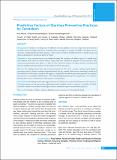Please use this identifier to cite or link to this item:
https://hdl.handle.net/20.500.14356/1395| Title: | Predictive Factors of Diarrhea Preventive Practices by Caretakers |
| Authors: | Pathak, Priya Munsawaengsub, Chokchai Nanthamongkolchai, Sutham |
| Citation: | PathakP., MunsawaengsubC., & NanthamongkolchaiS. (2019). Predictive Factors of Diarrhea Preventive Practices by Caretakers. Journal of Nepal Health Research Council, 17(2), 247-252. https://doi.org/10.33314/jnhrc.v0i0.1876 |
| Issue Date: | 2019 |
| Publisher: | Nepal Health Research Council |
| Article Type: | Original Article |
| Keywords: | Caretakers Children Chitwan Diarrhea preventive practices 6-12 months old Nepal |
| Series/Report no.: | Apr-June, 2019;1876 |
| Abstract: | Abstract Background: Diarrhea is a leading cause of childhood mortality globally as well as in Nepal. Data all around the world has shown the highest prevalence of diarrheal disease amongst 6-12 months old children. This paper aims to assess the existing diarrhea preventive practices carried out by caretakers of children from 6-12 months of age and their predicting factors in Chitwan district of Nepal. Methods: A cross -sectional survey was conducted among 384 caretakers of children aged 6-12 months from four different MCH clinics of Chitwan district, Nepal. Data were collected by using face- to-face interviews with structured questionnaires from April 15 to May 30, 2018. Univariate analysis, chi square, Pearson correlation and stepwise multiple regression analysis were the statistics used for data analysis. Results: The findings showed that only around one-fourth (22.7%) of the caretakers followed good diarrhea preventive practices. Stepwise multiple regression showed that age, monthly family income, knowledge, attitude and accessibility to WASH (water, sanitation and hygiene), could predict the diarrhea preventive practices of caretakers by only 20.5%. Accessibility to WASH (beta= 0.246) had the highest predictive power and age (beta= 0.015) had the least predictive power of diarrhea preventive practices amongst them. Conclusions: The findings of this study suggest that there is a definite need to promote diarrhea preventive practices. Local government and non-government organizations should establish activities to improve accessibility to WASH, caretaker’s attitude and caretaker’s knowledge in order to ultimately improve their preventive practices. Keywords: Caretakers; children; chitwan; diarrhea preventive practices; 6-12 months old; Nepal |
| Description: | Original Article |
| URI: | http://103.69.126.140:8080/handle/20.500.14356/1395 |
| ISSN: | Print ISSN: 1727-5482; Online ISSN: 1999-6217 |
| Appears in Collections: | Vol. 17 No. 2 Issue 43 Apr - Jun 2019 |
Files in This Item:
| File | Description | Size | Format | |
|---|---|---|---|---|
| 1876-Manuscript-10754-1-10-20190804.pdf | Fulltext Download | 219.64 kB | Adobe PDF |  View/Open |
Items in DSpace are protected by copyright, with all rights reserved, unless otherwise indicated.
